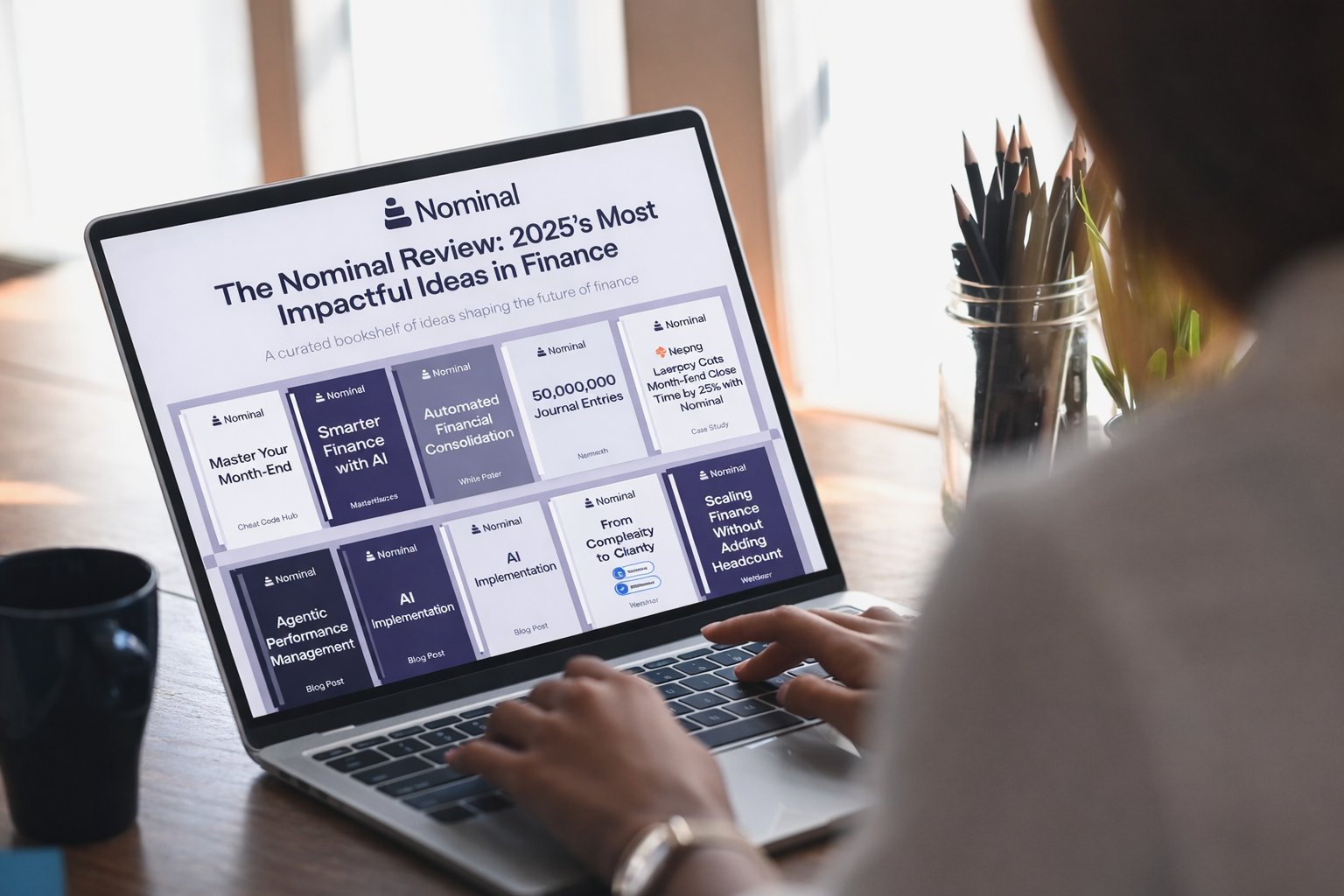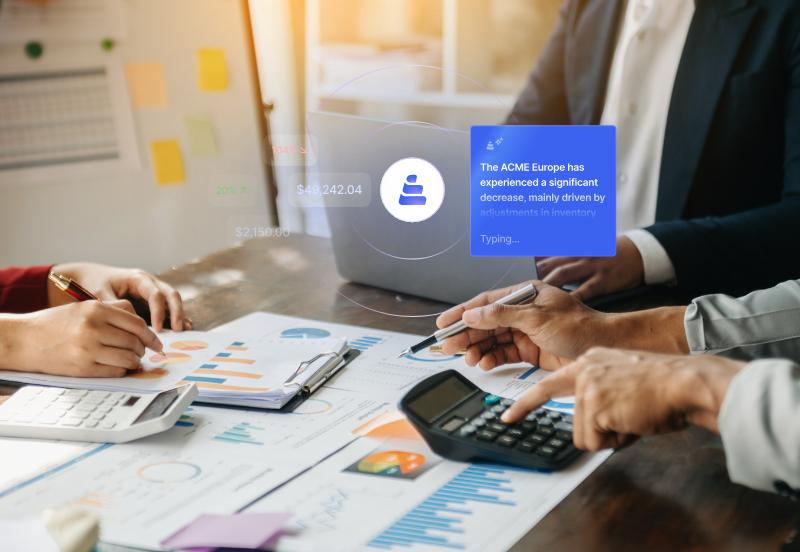
Agentic AI in accounting refers to autonomous systems capable of executing tasks such as reconciliations, variance analysis, and financial reporting. Unlike traditional automation, these systems adapt to context, make decisions within defined rules, and reduce manual effort in complex workflows across multi-entity, compliance-heavy environments.
Agentic AI is becoming an increasingly relevant topic in enterprise finance, especially as accounting teams contend with fragmented systems, growing compliance demands, and the constant pressure to accelerate close cycles.
More than a trend, it reflects a shift in how automation is being designed, deployed, and trusted to operate within critical processes.
At its core, this new model of intelligent automation is not just about interpreting data. It’s about taking initiative. These systems work within set guardrails, but they can trigger actions, flag anomalies, and coordinate steps in complex workflows.
For finance teams that rely on accuracy and timeliness, the value lies in both execution and accountability.
To better understand how this concept works in real-world accounting environments, we look at insights shared in the latest episode of Bottom Lines, hosted by Nominal’s CEO, Guy Leibovitz.
In this session, he walks through a series of examples showing how autonomous AI agents handle lease reporting, balance sheet summaries, and working capital analysis based on natural language prompts and internal data access.
The following breakdown dives into what defines Agentic AI, how it differs from earlier forms of automation, and the types of accounting tasks that benefit most from this shift.
What Is Agentic AI?
Agentic AI describes a class of intelligent systems that can independently pursue goals, make decisions based on context, and take action without requiring explicit step-by-step instructions.
These systems are designed to operate within defined rules and data environments, enabling them to complete tasks with minimal human oversight. Unlike traditional bots or scripts, they don’t just follow pre-coded workflows. They assess information, select actions, and adapt as conditions change.
The distinction between this type of automation and what came before is significant. Robotic Process Automation (RPA), for instance, is built around repeatable logic but lacks the flexibility to respond to dynamic inputs.
Generative AI, while more context-aware, is primarily designed to produce language, code, or content. Agentic systems go a step further by integrating reasoning capabilities with the ability to execute tasks that drive actual business outcomes.
This evolution is possible because of how today’s AI agents are constructed. By combining access to internal systems with models that can reason and plan, they interact with business data the way a human analyst might.
They are not limited to answering questions or generating responses. They can carry out multi-step processes like reconciliation, variance detection, or close monitoring with full traceability and logical consistency.
In the context of financial operations, this means the potential no longer stops at analysis. Agentic systems can review transactions, surface exceptions, propose adjustments, and even generate reports based on the company’s own accounting structure and policies.
The outcome is not just faster processing but a higher degree of reliability and insight throughout the financial cycle.
Explore more on this topic: Agentic AI: The New Era of Autonomous Automation in Finance
Why It Matters for Accounting and Finance
Accounting teams operate under constant pressure to close books accurately and on time, all while managing growing volumes of data and increasingly complex compliance requirements.
In this environment, the limits of traditional automation are becoming more visible. Tools that rely on rigid scripts or rules often break when data is inconsistent or workflows change, leaving finance professionals to resolve issues manually.
Agentic systems offer a fundamentally different approach. Rather than waiting for a command or running on a fixed trigger, they assess conditions in real-time and take appropriate action within defined parameters.
For example, if a subledger is incomplete or a lease entry is delayed, an agentic system can identify the issue, flag it, and even suggest or perform the corrective action based on historical data and business context.
This adaptability is especially useful in multi-entity environments, where consolidations, eliminations, and reporting cycles often involve dozens of interdependent steps. In these cases, agentic systems act as operational collaborators, working in the background to maintain consistency, detect anomalies, and reduce the number of manual interventions required to get to a clean close.
The result is more than time saved. It’s a structural shift that improves data integrity, reduces audit exposure, and increases visibility into the financial health of the organization.
By embedding this type of intelligence into everyday workflows, finance teams can shift their focus from error correction to decision-making.
Curious how other finance teams are putting AI to work? Dive into more episodes from our Bottom Lines series:
- Generative AI for Flux Analysis
- AI Agents in Finance and Accounting: From Manual Tasks to Strategic Insights
- AI-Powered Document Processing for Lease Accounting
Real-World Agentic AI Use Cases at Nominal
Agentic systems prove their value through action. In live environments, they take on tasks that once required manual oversight, cross-system workarounds, or hours of review.
Below are five real examples of how finance teams are already applying agentic AI to reduce friction and increase confidence in their accounting workflows.
Detecting bottlenecks in the close process
In the Bottom Lines demo, a simple prompt — “Where is my bottleneck during the launch process?” — triggers an autonomous review of the close cycle. The system identifies a delay caused by missing lease entries and surfaces the result instantly.
Rather than scanning spreadsheets or sending follow-ups, the team receives a precise answer tied directly to ERP data.
Visualizing lease payment obligations
When asked to list all leases, the agent returns a structured dataset. But when the prompt is updated to request a visual, the system produces a bar chart showing payment volume across entities.
This shift from data extraction to contextual presentation reduces the need for Excel formatting or BI dashboards and supports faster decision-making.
You might also like: It's Time to Look for Excel Alternatives: Assess Your Spreadsheet Dependency
Summarizing balance sheet changes by period
In another example, the agent is prompted to compare balance sheet data between Q3 and Q4. Instead of returning a raw export, it provides a structured summary highlighting key changes and relationships.
These on-demand summaries support internal reporting, review meetings, and audit preparation with consistent outputs and clear reasoning.
Performing working capital analysis
A follow-up prompt leads the system to run a working capital analysis using current balance data. The agent calculates key metrics, explains changes in positioning, and identifies potential risks: all without needing to pull data into a separate workbook or reconcile figures manually.
Explaining period-to-period flux
Flux analysis is one of the most time-consuming parts of the month-end close cycle. Here, the agent is able to identify material movements, link them to business drivers, and generate clear, written explanations. This is especially useful in multi-entity environments where teams need to justify changes and document their reasoning for auditors.
Agentic AI is not a future ambition for finance. It is an active shift in how accounting work gets done. From detecting process delays to generating reports on demand, intelligent systems are stepping into roles that once required hours of manual effort.
The impact is not just speed, but structure. Fewer bottlenecks. Better visibility. More time for decisions that actually move the business forward.
To see how this works in practice, book a demo with Nominal and explore real agentic workflows in a close and reporting environment.





